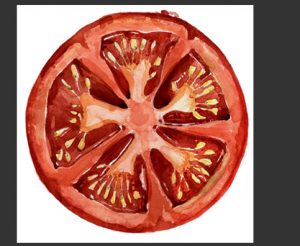I remember. I was in Quebec City with a pregnant Amy when all this went down. Doing hour-long iradio interviews where midnight callers asked about aliens and Salmonella.
Michael Booth of the National Law Journal reports the U.S. Food and Drug Administration cannot be held liable for financial damages suffered by farmers when it issues emergency, but erroneous, food safety warnings, the U.S. Court of Appeals for the Fourth Circuit has ruled.
In its Dec. 2 ruling, the Fourth Circuit refused to allow a South Carolina tomato farmer to seek more than $15 million in damages from the federal government under the Federal Tort Claims Act after the FDA issued a warning that an outbreak of Salmonella Saintpaul was caused by contaminated tomatoes, when it was later determined that the outbreak was caused by contaminated peppers imported from Mexico.
A South Carolina tomato farm, Seaside Farm on St. Helena Island, sued the federal government, claiming that the incorrect warnings issued by the FDA, beginning in May 2008 and later corrected, cost it $15,036,294 in revenue. The Fourth Circuit agreed with a trial court that the FDA was acting within its authority to issue emergency food safety warnings based on preliminary information in order to protect public health.
“We refuse to place FDA between a rock and a hard place,” wrote Judge J. Harvie Wilkinson for the panel, sitting in Richmond.
“One the one hand, if FDA issued a contamination warning that was even arguably overbroad, premature, or of anything less than perfect accuracy, injured companies would plague the agency with lawsuits,” he said.
“On the other hand, delay in issuing a contamination warning would lead to massive tort liability with respect to consumers who suffer serious or even fatal consequences that a timely warning might have averted,” Wilkinson said.
Judges Paul Niemeyer and Dennis Shedd joined in the Dec. 2 ruling.
The medical crisis arose on May 22, 2008, when the New Mexico Department of Health notified the Centers for Disease Control and Prevention (CDC) that a number of residents had been diagnosed as having Salmonella Saintpaul, a strain that causes fever, diarrhea, nausea and, if left untreated, death. Soon after, similar reports came in from Texas.
The CDC determined that a “strong statistical” analysis determined that the illnesses were caused by people eating raw tomatoes. By June 1 of that year, CDC was investigating 87 illnesses in nine states.
 The FDA then issued a warning to consumers in New Mexico and Texas. By June 6, 2008, however, reported cases grew to 145 incidents in 16 states. In New Jersey, three people were reported to have been diagnosed with the illness. On June 7, the FDA issued a blanket nationwide warning telling consumers that they should be wary of eating raw tomatoes. (New Jersey tomatoes were not implicated, since they do not ripen until later in the season.)
The FDA then issued a warning to consumers in New Mexico and Texas. By June 6, 2008, however, reported cases grew to 145 incidents in 16 states. In New Jersey, three people were reported to have been diagnosed with the illness. On June 7, the FDA issued a blanket nationwide warning telling consumers that they should be wary of eating raw tomatoes. (New Jersey tomatoes were not implicated, since they do not ripen until later in the season.)
The warning listed a number of countries and states, including South Carolina, that were not included and were not implicated, but those states were not listed in media reports. Eventually, 1,220 people were diagnosed as having Salmonella Saintpaul.
Raw tomatoes were not the cause of the illnesses, however. The contamination was traced to imported jalapeño and serrano peppers imported from Mexico.
Seaside Farm, which had just harvested a large crop of tomatoes, sued in May 2011. The farm claimed the erroneous FDA warning about tomatoes cost it $15 million-plus damages in revenue.

